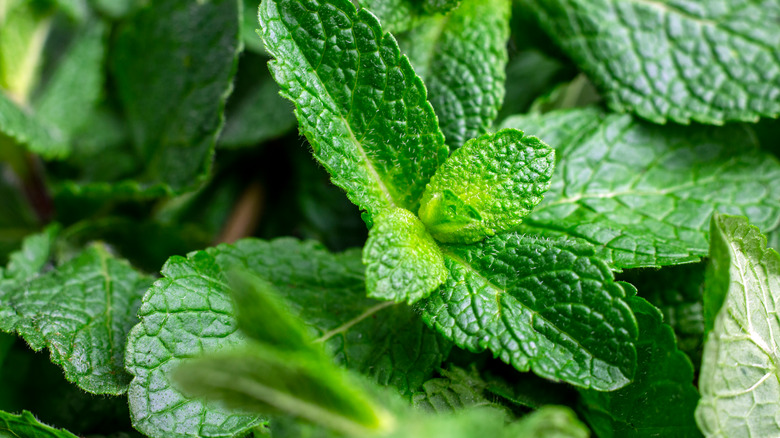Does Mint Help With Nausea?
Mint is a herbaceous plant commonly used in everyday items, like gum, recipes, and health remedies. The term "mint" covers several types of the mint plant, Alamanac reports, such as peppermint, orange mint, or spearmint. Mint plants are perennials, meaning they last for several growing seasons or two to three years. Shortly before mint blooms, around July or August, or when the season is dry, the essential oils found in mint are at their peak, and that's when harvest occurs, according to Cancer Pal.
Peppermint is one of the most common types of mint plants to be harvested and is produced in America for distribution worldwide. Peppermint is a hybrid of watermint and spearmint and has been used for medicinal purposes since ancient Egyptian times (via Cancer Pal). The essential oils of peppermint contain a variety of ingredients, like menthol, which has been known to effectively help with congestion, Medical News Today reports. Research has shown peppermint can help alleviate menstrual pain and indigestion, as well. But can peppermint or any type of mint help with nausea?
How mint relieves nausea
Today, mint can be used to help relieve nausea, just as it did hundreds of years ago. According to Everyday Health, ingesting peppermint can calm the muscles in your stomach, especially for people with irritable bowel syndrome or indigestion, which also helps with nausea. Even the smell of peppermint may possibly alleviate nausea, per the findings of a 2014 trial published in the Journal of PeriAnesthesia Nursing.
Not everyone is a fan of peppermint, so you can also use spearmint to alleviate nausea, according to Medical News Today. Spearmint's sedative properties aid with nausea, contrary to peppermint's stimulant properties.
There are also people who shouldn't use mint as a health remedy because it could be dangerous for them. Certain mints, like peppermint, shouldn't be used when taking specific medications, Medical News Today reports. Mint may interfere with antacids or medications for ulcers, high blood pressure, and stomach acid. A combination of mint and antacids may increase side effects of your medications, resulting in possible heartburn, for example. It's recommended that those who have certain health conditions, like gastroesophageal reflux disease or GERD, avoid peppermint and discuss with their doctor first.


